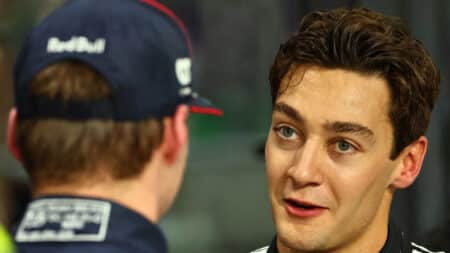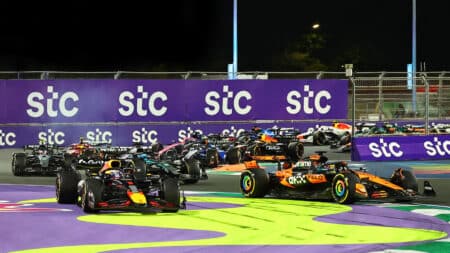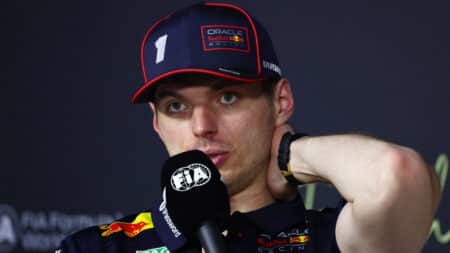He would barely recognise Silverstone today. Jim Clark won five British Grands Prix, three of them at the old airfield in 1963, ’65 and ’67, one at Aintree and the other at Brands Hatch. Five in six years: a remarkable record.

Today, Aintree’s motor sporting interest stretches only as far as the odd sprint event, but he’d still feel quite at home at Kent’s mini Nürburgring: topography and geography have limited Brands’ development to pit, paddock and run-off tweaks – thankfully.
As for the wide-open spaces of Silverstone it might as well be on Mars compared to the track he knew in 1963.
In 1948, the year in which Silverstone hosted its first British Grand Prix, George Orwell published 1984, to my mind the most important novel of the 20th Century. Within his terrifying (and in some respects uncannily accurate) vision of future society, Orwell’s Britain has become Airstrip One in the wake of the atomic war that has wiped out much of what once was.
When I first read the book as an impressionable 14-year-old, Airstrip One created an image in my mind of Britain having become a sea of endless concrete, a desolate, featureless place lacking character.
Hmm. Sounds familiar… You can see where I’m going with this.

Of course, Silverstone has been forced to adapt and change, thanks largely to the vindictiveness of Bernie Ecclestone. Funded and owned privately, it had no choice but to evolve if it was to keep the British GP.
Now, it is no longer shabby (well, it is, but ‘only’ for the unfortunate paying public…) and can hold its own with the Bahrains and Shanghais of this world. The modern circuit is a testament to a huge amount of work and commitment, we wouldn’t be without it and indeed British motor sport should be proud of the place.
It’s just a shame that Silverstone has lost what soul it had. The place was always hard to love: for most of us now, it’s impossible.
But its central role within British motor sport remains unchallenged. This weekend really heralds the beginning of the summer season, and Silverstone will be in sharp focus, not only at the Grand Prix but also at the Classic historic meeting on July 26-28. The latter is officially the biggest race meeting in the world and to gear up for this seasonal highlight we present David Coulthard driving Clark’s Lotus 25 in the August issue, on sale this week.

DC was himself a double British GP winner at Silverstone, of course, and being a proud Scot with a knowledge and appreciation for history he needed little persuading to slip into the monocoque of one of the great Formula 1 cars. The circuit’s changed, but drivers don’t and he revelled in the timewarp experience. Gordon Cruickshank writes about the test for us, and you can watch it here on the Motor Sport website and on the BBC this weekend, too.
On the other side, Martin Brundle will also be lapping Silverstone in something old – albeit a car with a very personal connection. The Sky F1 commentator was reacquainted with the Ralt RT3 in which he took on – and on occasion beat – Ayrton Senna in Formula 3 30 years ago. Our features editor Simon Arron, who reported on some of those races for Motoring News back in the day, was also there to witness the reunion. And if you happen to read the magazine on tablet devices, look out for the added extra: Simon’s own tape of an interview he conducted with Senna back in 1983.
Elsewhere in the issue, Nigel Roebuck recalls the life of that ‘Brown-Eyed Handsome Man’, Lorenzo Bandini; Simon Taylor lunches with one of the nicest men in motor racing and – to me – a West Country cult hero, Win Percy; and Jessica Dane brings us a fascinating joint interview from Down Under, as former MotoGP ace Casey Stoner discusses his four-wheel switch with his engineer, ex-Williams F1 man John Russell.

Finally, I must mention our deputy editor’s column this month (Mr Cruickshank has been a busy chap). Nudged by a reader’s letter, GC rediscovered a BBC TV play made in 1968 centred on Stirling Moss, Denis Jenkinson and the Mille Miglia in 1955. Written by respected playwright Athol Fugard, it stars Michael Bryant as Moss, with Jenks represented by Ronald Lacey – better known to me as the leather-clad Nazi henchman in Raiders of the Lost Ark.
As Gordon writes, the play is deeply flawed – and both Moss and Jenks hated it – but I must say, I found it riveting. There is so much wrong with it, in terms of the characterisation of these great friends. But it’s a fascinating piece of drama that even features a real Mercedes 300SLR.
It also shows that stories about motor racing can be told without even leaving a studio. It’s a wonderful oddity.








